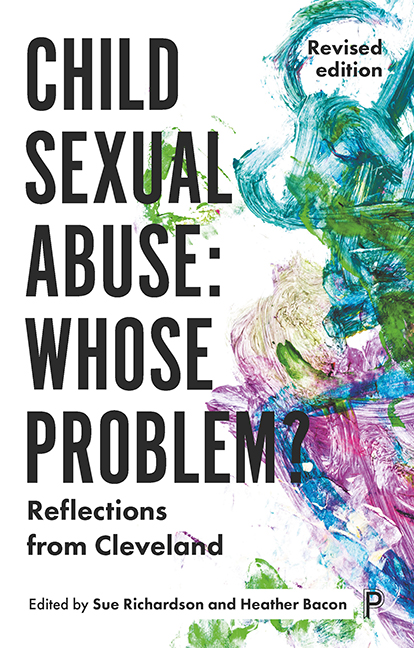Book contents
- Frontmatter
- Dedication
- Contents
- List of tables and figures
- List of abbreviations
- Notes on the editors and contributors
- Acknowledgements
- Preface
- Introduction:Why Cleveland still matters: connections with a new era
- one From Colwell to Cleveland: 1973 to 1988
- two A framework of belief
- three The medical diagnosis of child sexual abuse: the paediatrician’s dilemma
- four After the medical diagnosis: everyone’s dilemma
- five The continuum of disclosure
- six Seen but not heard: the children of Cleveland
- seven The unwanted message: child protection through community awareness
- eight Questions not answers: progressing the debate
- Conclusion:Thirty years later: how far have we progressed?
- Appendix
- References
- Index
two - A framework of belief
Published online by Cambridge University Press: 13 April 2022
- Frontmatter
- Dedication
- Contents
- List of tables and figures
- List of abbreviations
- Notes on the editors and contributors
- Acknowledgements
- Preface
- Introduction:Why Cleveland still matters: connections with a new era
- one From Colwell to Cleveland: 1973 to 1988
- two A framework of belief
- three The medical diagnosis of child sexual abuse: the paediatrician’s dilemma
- four After the medical diagnosis: everyone’s dilemma
- five The continuum of disclosure
- six Seen but not heard: the children of Cleveland
- seven The unwanted message: child protection through community awareness
- eight Questions not answers: progressing the debate
- Conclusion:Thirty years later: how far have we progressed?
- Appendix
- References
- Index
Summary
Editors’ summary
This chapter emphasizes the need for stronger advocacy for children, pointing out that, whenever there was conflict between the interests of adults and the interests of children, the former were always more strongly represented. This was particularly true of the legal system, whose procedures made it difficult for children to get a fair hearing. We describe the phenomenon of society's denial of child sexual abuse and highlight the importance of a framework of belief which can uphold children's rights and find creative ways of managing conflict.
If we are to retain our belief in a child-centred approach, then we cannot totally protect the adult's rights of justice at the same time. A compromise must be decided upon and adhered to when pressures mount to shift the balance away from the child towards the adult. (J. Sloan and J. Murdoch, 1990)
Introduction
We have learned from our experience in Cleveland that effective work in child protection needs to be grounded in a clear, explicit and shared belief system which can form the foundation for inter-agency agreement and cooperation. Whilst recognizing that child sexual abuse is a complex problem, requiring a sophisticated and sensitive model for intervention, we wish to emphasize those aspects which centrally concern the child's state, the child's response to intervention and the obligations we have as adults towards the child. At the same time, we accept the view of the Cleveland Inquiry that ‘a child's needs and best interests cannot be fully considered in isolation from knowledge about, and full understanding of, all the circumstances relating to its parents’ (Butler-Sloss, 1988, para. 4.158, p. 75). An assumption has emerged from Cleveland that intervention which is opposed by parents can eventually be superseded by an approach which, while being child-centred, recognizes that parents and children have equal rights. In striving for this goal, we recognize that at present children's rights are not given equal weight, particularly within the legal system. For this reason, we believe that a healthy balance between children's and adults’ rights can be achieved only by placing more weight on the side of the child until the present imbalance is redressed. In this book we address ways in which all adults, not only those involved in child protection work, can help to shift this balance through a process of child advocacy.
- Type
- Chapter
- Information
- Child Sexual Abuse: Whose Problem?Reflections from Cleveland (Revised edition), pp. 63 - 82Publisher: Bristol University PressPrint publication year: 2018



